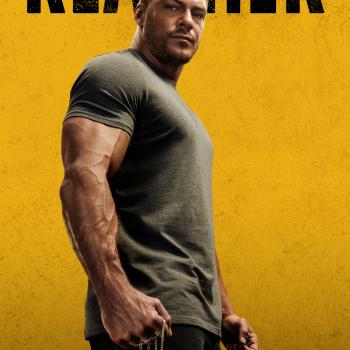Review of The Dark Knight Rises, Directed by Christopher Nolan
By KENDRICK KUO
In continuation of Alexis and Paul’s tracing of Christian themes in blockbuster action films, I’d like to add my own voice. Both have argued for the power of Christian mythology (in the true, Narnian sense of the term) in the storyteller’s craft. Tales that touch us most deeply are those that echo the Great Story and its handmaiden themes. With this, I am in full agreement. Paul addressed both the Christological aspects of The Dark Knight Rises, balancing that with what he sees as pagan building blocks. I’d like to fill in these Christological colors and demonstrate what I see as the overwhelmingly Christian roots of Christopher Nolan’s Dark Knight legend.
[Spoilers below.]
The Dark Knight trilogy hinted at the vague outline of life, death, and resurrection. In Batman Begins, Nolan recounts the forging of a legend. The messiah refuses to join the ranks of the Evil One and wages war against him. He fights valiantly (I said vague outline right? Let’s discount Bruce Wayne’s debauchery) and wins the heart of the audience as their hero. At the climax of The Dark Knight, the Dark Knight chooses to switch places with the White Knight, whereby Batman truly becomes the Dark Knight and the Harvey Dent’s record is expunged. “He who knew no sin [became] sin on our behalf, so that we might become the righteousness of God” (2 Cor. 5:21). Interestingly, Harvey’s fall is the result of listening to the manipulative, truth-twisting words of the slithering Joker. And that leads us to The Dark Knight Rises.
The crux of The Dark Knight Rises really lies in Batman’s conquering of a metaphorical death. After watching Bane utterly crush our hero in a heart-breaking scene, the audience gets a sense of hopelessness. I caught myself wondering how our Bruce Wayne could physically defeat such a behemoth. Bane throws Batman into a prison described as a literal hell on earth where the suffering is not physical, but the hopelessness sprouting in the hearts of its inmates when they look up at the sky, knowing that escape is impossible. From this, our Dark Knight is resurrected, conquering “death” and then later conquering the Enemy, bringing freedom.
The metanarrative of the trilogy isn’t the only pointer to the Great Story.
The Dark Knight Rises explicitly speaks of the Christian triad of virtues: faith, hope, and love. Robin (later revealed) and Commissioner Gordon both place their faith in Batman despite what others think. Though he is painted as a villain, a charlatan, there are those who keep the faith.
The second virtue, hope, is by far the most prominent—almost a banner sign over the entire film. Bane wants to give the people of Gotham a false hope, thinking that life will not come to an end. Batman gives the people true hope, and not only a hope, but he brings it to fruition in his victory over death.
And what greater love is there than one laying his life down for his friend (John 15:13)? When Catwoman asks him to escape with her, reasoning that he’s already given so much. Batman’s reply: he hasn’t given everything yet. The implication is deafening. He has yet to give up his life. On top of this, Nolan portrays Batman having a deep-seated compassion and love for the people of Gotham. While he languished in prison, Bane’s psychological attack was to let him watch Gotham implode on television, knowing that seeing this would do more damage than any amount of torture.
Agreeing with Paul, I know that Nolan has not decided to hide Christian propaganda under every rock and behind every tree; and yet, like Paul, know that as a master storyteller, Nolan naturally draws from the well of Christian mythology. In the narrative and themes of The Dark Knight trilogy, and in particular its finale, I see a depth of Narnian magic that far outweighs its pagan roots.
———-
There are more Patheos perspectives at The Dark Knight Rises Reviews page.












